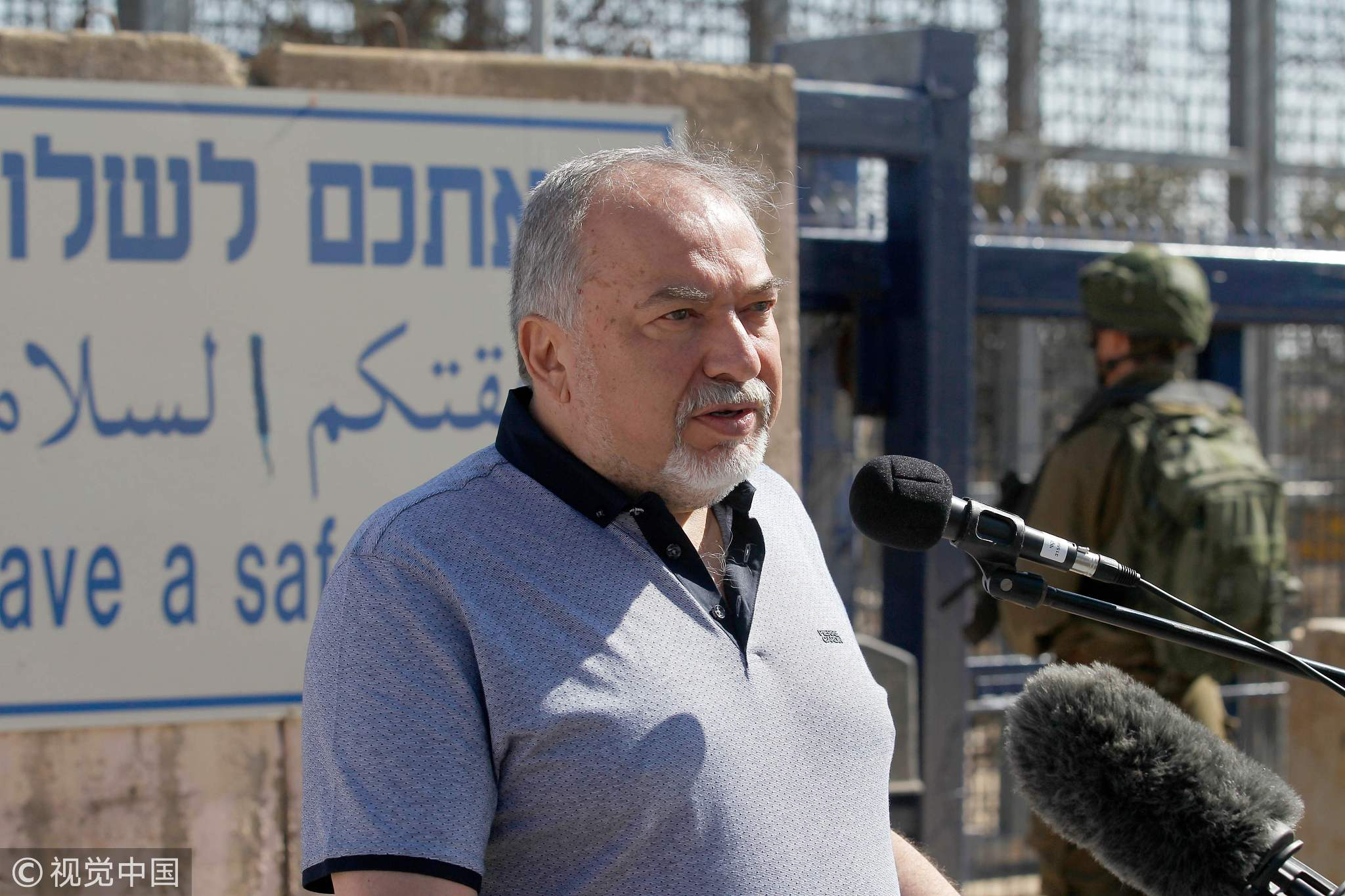
Opinions
20:21, 15-Nov-2018
Opinion: Ceasefire in Gaza, political earthquake in Israel
Updated
20:03, 18-Nov-2018
Wang Jin

Editor's note: Wang Jin is a research fellow at Charhar Institute and the Northwest University of China. The article reflects the author's opinion, and not necessarily the views of CGTN.
After days of armed tension between Israeli forces and Hamas in Gaza, the two sides reached a ceasefire. However, the truce was described by many Israeli right-wing politicians as "shameful", and Defense Minister Avigdor Lieberman, who leads the right-wing party Yisrael Beiteinu, announced his resignation from the government of Prime Minister Benjamin Netanyahu in protest. The recent developments might push the Israeli government to the brink of collapse.
Netanyahu's government was established on a fragile coalition between the right-wing Likud party and several parties in the Israeli parliament, or Knesset, after the 2015 election. On the one hand, Netanyahu has to maintain the frail ties between different parties inside his cabinet, while handling the challenges from leaders both inside his cabinet and outside.

Israeli Prime Minister Benjamin Netanyahu (C) waves to his supporters at his election campaign headquarters in Tel Aviv, Israel, March 17, 2015. /VCG Photo
Israeli Prime Minister Benjamin Netanyahu (C) waves to his supporters at his election campaign headquarters in Tel Aviv, Israel, March 17, 2015. /VCG Photo
At the beginning of his term, Netanyahu hoped to attract the left-wing Labor Party into his cabinet, given that the Zionist Union led by Isaac Herzog, the leader of the Labor Party at the time, won 24 seats in the Knesset.
A coalition between the Likud and Zionist Union might have led to a stronger government that dominated the Knesset, but that failed.
The internal split in the Zionist Union and Labor Party was obvious, and finally, Herzog's leadership in Labor Party was later replaced by Avi Gabbay. Netanyahu also faced huge pressure from both the Likud members and other right-wing political parties inside his cabinet over the coalition, and finally, Netanyahu had to give up this coalition and find a new partner from the Knesset.
The new partner was Avigdor Lieberman, an important member of the Likud before he left and established his new party, Yisrael Beiteinu in 1999. As a Soviet-born Israeli politician, Lieberman was able to attract the votes of many Russian Jews and his hardline rhetoric over foreign affairs made him competitive in the Israeli political arena.
After Netanyahu dismissed Moshe Ya'alon from the post of defense minister, Lieberman became the new head of the ministry and his party Yisrael Beiteinu also joined the cabinet.
For Lieberman, the ministerial post is critical to his path towards becoming the Prime Minister in the future. Although Lieberman upholds the political philosophy of the right-wing, his lack in military experience limits his political image.

Former Israeli Defense Minister Avigdor Lieberman addresses the media during a visit to the Israel-Syria border Quneitra crossing in the annexed-Golan Heights, September 27, 2018. /VCG Photo
Former Israeli Defense Minister Avigdor Lieberman addresses the media during a visit to the Israel-Syria border Quneitra crossing in the annexed-Golan Heights, September 27, 2018. /VCG Photo
For most Israelis, one criterion for choosing a prime minister is whether the candidate enjoys outstanding military experience. From David Ben Gurion to Benjamin Netanyahu, every Israeli Prime Minister during the past seven decades had an extensive military experience, and many of them served as senior commanders within the Israeli Defense Forces (IDF) before starting their political life.
Lieberman, who came to Israel from the Soviet Union when he was 20 and served only for a short time in the IDF, needed to strengthen his "military background" to show he is able to provide a sense of security to his supporters in the elections.
After assuming the post of defense minister, Lieberman stressed the priority of Israeli security and expressed his hardline attitudes towards different sensitive regional issues.
On the Syrian issue, Lieberman threatened that the IDF was prepared to destroy any Iranian military presence in Syria to safeguard the security of northern Israel.
After "The Great March of Return" protests emerged along the border with Gaza, Lieberman threatened to take harsh measures to punish Hamas.
The peaceful protests slipped into violence between Palestinians and IDF soldiers. Some Palestinians used kites and balloons to set fire on the Israeli side of the border, while some Hamas members struck Israeli targets with rockets launched from Gaza. Israeli soldiers also used force to target protesters.
The Gaza issue has become increasingly sensitive. On the one hand, a potential counterattack could lead to a "humanitarian crisis" in Gaza, while on the other hand Israeli right-wing politicians and groups believe that Israel should take harsher measures by mounting military action against Hamas in Gaza.
Next year will witness a new Knesset election, and Netanyahu has been caught between two fires after accepting a ceasefire with Hamas. Lieberman's resignation as defense minister might lead to an earthquake in Israeli politics, given that he and other right-wing politicians have been challenging Netanyahu's leadership.
(Cover Photo: Palestinian residents celebrate the resignation of Israel's Defense Minister Avigdor Lieberman, in Gaza, November 14, 2018. /VCG Photo)
(If you want to contribute and have specific expertise, please contact us at opinions@cgtn.com.)

SITEMAP
Copyright © 2018 CGTN. Beijing ICP prepared NO.16065310-3
Copyright © 2018 CGTN. Beijing ICP prepared NO.16065310-3